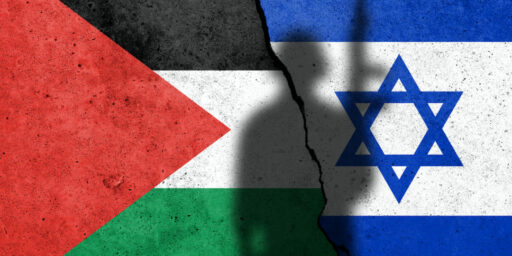Palestinian Civil War?
As the Israelis ready for their historic pullout from the Gaza strip, intra-Palestinian conflict is turning violent.
Hamas, Fatah face off over Gaza (Globe and Mail, A12)
With only six weeks left until Israel begins its unprecedented pullout from the Gaza Strip, Palestinian political factions are jockeying for position to see who can reap the most benefits. They are also vying for physical control over the land to be evacuated — more than 30 per cent of the Gaza Strip, including settlements, army outposts and access roads — and, by extension, control of the entire area.
Yesterday, Hamas and soldiers of the Palestinian Authority waged fierce gun battles in northern Gaza, Reuters reported, after militants launched a rocket from the area that killed an Israeli woman. The fighting was the worst in years among Palestinians in the occupied territory, underscoring the tough challenge Palestinian Authority president Mahmoud Abbas faces to consolidate his control in Gaza before the Israeli pullout.
Observers had already started questioning whether the security forces — who are hand-picked for their loyalty to the mainstream Fatah grouping of Mr. Abbas — are up to the job of controlling Gaza. “I don’t see that the Palestinian Authority has the intention or the capability to take control of the areas to be evacuated,” said Martin Indyk, a former U.S. State Department official with special responsibility for Israeli-Palestinian affairs.
Politically and militarily, the main rival to Fatah is the Hamas Islamic Resistance Movement, which appears to be partly shedding its terrorist past in favour of a new-found political pragmatism. Hamas is now poised to play a major role in the government of the Gaza Strip after the Israeli pullout, a period which many observers see as a test of whether the Palestinians can run their own affairs in an area free of Israeli occupation.
The Palestinian leadership and Hamas are locked in a complex political dance over whether and how to share power in post-occupation Gaza, and what implications such an arrangement might have for the future of Palestinian politics. Hamas has proposed the establishment of a “national-Islamic committee” to run Gaza, while the Palestinian Authority has invited Hamas and other factions to join the existing administration. Each side has rejected the other’s proposal, for fear of ending up as the junior partner.
For decades, Fatah has been the dominant force in Palestinian politics. Recent surveys by leading pollster Khalil Shikaki suggest they would still romp home with 44 per cent of the vote if parliamentary elections were held tomorrow. But Hamas, which has boycotted previous elections because it rejects the recognition of Israel implicit in the Oslo accords, took a strategic decision this year to enter politics, emerging as a potent political opposition. Mr. Shikaki predicts Hamas would win 33 per cent in parliamentary elections.
Palestinian in-fighting in Gaza (BBC)
Clashes in Gaza between Palestinian Authority security forces and members of the Hamas militant organisation have killed two bystanders and injured 20. The fighting in Gaza City started on Thursday and continued into Friday morning before appearing to die down. On Thursday night, Israeli helicopters fired missiles at targets in Gaza. The strikes came after a woman in Israel was killed by a rocket fired from the Gaza Strip on Thursday. The al-Aqsa Martyrs’ Brigades and Hamas said they carried out Thursday’s rocket attack, in response to the killing of an Islamic Jihad leader by the Israeli army in the West Bank town of Nablus.
Palestinian leader Mahmoud Abbas has gone to Gaza to hold talks with armed groups, in an attempt to put an end to militant attacks. BBC Gaza correspondent Alan Johnston says that the Palestinian leadership appears to have launched a concerted effort to exert its authority by force.
There are reports of Palestinian security forces coming under fire from rocket-propelled grenades and sporadic bursts of gunfire could be heard on Friday morning. Private cars blaring their horns raced through the city carrying the injured. But the situation is now reported to be calmer in the Zeitoun area of Gaza City, with the Palestinian Authority units having apparently pulled back.
In some of the worst violence between Palestinians in recent years, Hamas militants set fire to a police station, a police armoured personnel carrier and three jeeps.
[…]
Violence escalated on Tuesday, when an Islamic Jihad militant killed five Israelis in a suicide bombing in the Israeli coastal resort of Netanya. Israel responded by carrying out raids in Nablus. This in turn triggered Thursday’s rocket attacks by al-Aqsa Martyrs’ Brigades and Hamas. Soon after the rocket attacks, Palestinian police, reportedly acting on orders to stop further rocket fire, clashed with Hamas members in northern Gaza.
Given that terrorism has been the sine qua non of Palestinian politics for generations, this will likely get worse before it gets better.





Palestinian terrorist fighting Palestinian terrorists,
WOW.
Those Israelis can engineer anything
smile!!!
Let the terrorists kill each other – it will save Israel and the US the trouble. it is just a shame that so many innocents will get caught up in the cross-fire.